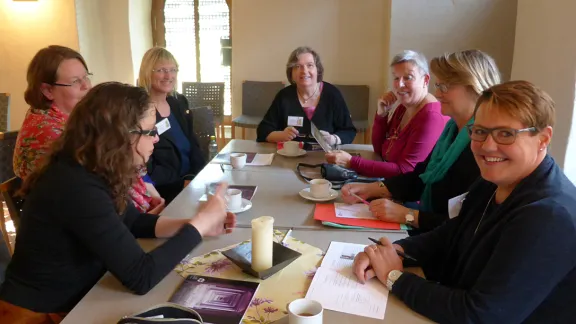
Bishop Guðmundsdóttir (third from right) and other participants of the European WICAS conference in Meissen. Photo: LWF/E. Neuenfeldt
Iceland’s Bishop Guðmundsdóttir Reflects on her Leadership Journey
(LWI) – Forty years ago Solveig Lára Guðmundsdóttir attended a worship service at the Reykjavík cathedral that changed her life.
It was the ordination service for Rev. Auður Eir Vilhjálmsdóttir, the first woman to be ordained in Iceland in 1,000 years of Christianity.
Guðmundsdóttir, now a bishop in the Evangelical Lutheran Church of Iceland, was touched to witness the historic ordination of her classmate’s mother.
“I was thrilled. I didn’t want to miss that historic event although I wasn’t much of a church goer at the time,” Guðmundsdóttir recalled in addressing the Women in Church and Society (WICAS) network regional conference at Meissen, Germany, 12-16 May.
“A woman could be an ordained minister in the church. That meant for me that a woman could do anything. This ordination service changed my life. Two years later this minister’s daughter and I both enrolled in the department of theology at the University of Iceland,” the bishop said.
Four years later, Vilhjálmsdóttir, still the only ordained woman in the church, introduced the female theology students to the work of the women’s desks of The Lutheran World Federation (LWF) and the World Council of Churches (WCC)., urging them to form a feminist theologians group.
“For me, this was a dream come true. I was able to combine my interest in theology and my women’s rights,” said Bishop Guðmundsdóttir, who was elected bishop in 2012 and now heads the North Icelandic bishopric Hólar.
The bishop was speaking to one of a series of regional WICAS conferences focusing on Women in the Ongoing Reformation and the LWF Gender Justice Policy.
Over the years of her formation as a minister and bishop in the Icelandic church, Guðmundsdóttir’s journey was nurtured by the group of feminist theologians, and guided by the groundbreaking work of the LWF and WCC women’s desks.
“We read feminist theology together, we wrote new liturgies, we travelled together, and invited people to meet with us, both from our country and from abroad.”
They began to ask critical questions: How can we learn to understand Christian service as a mutual responsibility of women and men? How can women be encouraged to take leadership roles in the church? How can congregations served by female pastors enrich the discussion on the ordination of women?
They were guided by women such as American theologian Constance Parvey, who worked for the WCC, and Musimbi Kanyoro, Nicole Fischer and Lone Fatum of the LWF.
“The work of the women’s desks both at WCC and LWF had a remarkable effect in Iceland and had great influence on the feminist theology group. It has affected the life and work of all of us who took part in the work of the group.
“We considered ourselves devoted disciples of the LWF as we worked a pioneering job in feminist theology in Iceland,” Guðmundsdóttir added.
The LWF women’s desk was instituted in 1970 and in 1984 the LWF ensured that at least 40 percent of participants at assemblies would be women. The bishop noted that the LWF’s will was clear, though it has not been an easy journey.
“They wanted equal rights, but the ‘problem’ was that in many churches there were no ‘qualified women’. In my opinion that was just an excuse from the churches. The men wanted to hold on to their power and did not have the courage to hand it over to women on such a great scale.
“So the LWF decided: We will get them qualified,” she said.
The LWF International Young Women’s Leadership Program brought together 50 women from all over the world and Guðmundsdóttir commented that she was “incredibly fortunate to be selected by my church to take part in this program.”
In the lead up to the 500th anniversary of the Lutheran Reformation in 2017, WICAS has been reflecting on the role of women in the reformation of the church. Bishop Guðmundsdóttir said that women have been reforming the church in Iceland for decades.
“Although we have had women in ordained ministry in the Evangelical Lutheran Church of Iceland almost 40 years now, we have had to wait a long time to have female bishops. In 2012, two out of three bishops in Iceland retired and everybody agreed that now was the time for a female bishop.
“To everybody’s surprise both positions were filled with women, so now we have 66 percent female bishops in Iceland. To our own surprise, both of us now serving as bishops in Iceland come from our old feminist theology group.
“We are … reforming the church, “ says Guðmundsdóttir.


